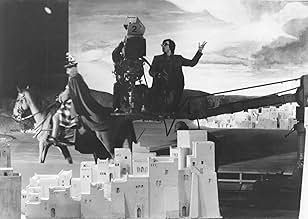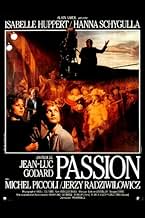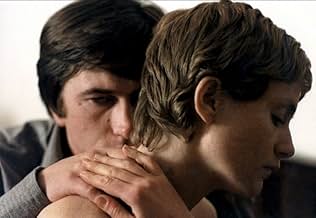Jerzy, un director polaco, está rodando un filme sobre pinturas famosas. Isabelle, una muchacha tartamuda de clase obrera, pierde su trabajo. Ambos se conocen, se convierten en amantes y se ... Leer todoJerzy, un director polaco, está rodando un filme sobre pinturas famosas. Isabelle, una muchacha tartamuda de clase obrera, pierde su trabajo. Ambos se conocen, se convierten en amantes y se van a vivir a Polonia.Jerzy, un director polaco, está rodando un filme sobre pinturas famosas. Isabelle, una muchacha tartamuda de clase obrera, pierde su trabajo. Ambos se conocen, se convierten en amantes y se van a vivir a Polonia.
- Dirección
- Guionistas
- Elenco
- Premios
- 1 premio ganado y 5 nominaciones en total
- Dirección
- Guionistas
- Todo el elenco y el equipo
- Producción, taquilla y más en IMDbPro
Opiniones destacadas
Godard's 'Passion' will inevitably draw violent reactions from didactic viewers with a classical Hollywood outlook, even though it expressly addresses the contradictions and pains in discerning just what makes a film "a film". To condemn it as boring or shapeless is to blindly miss the point.
For those of us more inclined to tackle this fascinating question, there is much to luxuriate in here. From even a purely aesthetic viewpoint, the wonderfully incongruent images (like the ship in the forest) and the beautifully lit reconstructions of classical paintings (with their attendant outpourings of classical music) are enough to hold sway.
With these tools, Godard contrasts the passion and belief in labour; the practical against the artistic. Isabelle Huppert's stuttering, incoherent virgin loves her factory job and fights for her "right" to work, while the jaded director Jerzy, surrounded by a bevy of naked beauties during the making of his elusive film, sullenly stages his reconstructions. His work, however, contains no such solace and he becomes morose to the point of inertia by his task of creating a formally perfect but outwardly fragmented piece. Jerzy's constant frustration with having to explain to others what his film is "about" is a poignant running comedic highlight. But that is only part of the battle - practical concerns impinge also. This is painfully clear (and bitterly funny) when Jerzy's ever suffering assistant points out to the frustrated producer the individual cost of each item on the set in an attempt to explain where all the money is going.
The characters aggressive tussling, either through physical pulling and pushing or through their cars (reminiscent of Godard's masterpiece 'Week End'), also signify the difficulty and pain inherent in any kind of birth. The quiet moments call out to be examined and celebrated as much as the grand statement while others jostle for their money, their moment, or even a simple explanation as to what it all means.
Like most of Godard's late work, this mosaic approach will not appeal to all who cross its path (what film ever does?) but, even if it does ultimately fall short of answering any of the questions it asks, adherents will find much to ruminate on.
For those of us more inclined to tackle this fascinating question, there is much to luxuriate in here. From even a purely aesthetic viewpoint, the wonderfully incongruent images (like the ship in the forest) and the beautifully lit reconstructions of classical paintings (with their attendant outpourings of classical music) are enough to hold sway.
With these tools, Godard contrasts the passion and belief in labour; the practical against the artistic. Isabelle Huppert's stuttering, incoherent virgin loves her factory job and fights for her "right" to work, while the jaded director Jerzy, surrounded by a bevy of naked beauties during the making of his elusive film, sullenly stages his reconstructions. His work, however, contains no such solace and he becomes morose to the point of inertia by his task of creating a formally perfect but outwardly fragmented piece. Jerzy's constant frustration with having to explain to others what his film is "about" is a poignant running comedic highlight. But that is only part of the battle - practical concerns impinge also. This is painfully clear (and bitterly funny) when Jerzy's ever suffering assistant points out to the frustrated producer the individual cost of each item on the set in an attempt to explain where all the money is going.
The characters aggressive tussling, either through physical pulling and pushing or through their cars (reminiscent of Godard's masterpiece 'Week End'), also signify the difficulty and pain inherent in any kind of birth. The quiet moments call out to be examined and celebrated as much as the grand statement while others jostle for their money, their moment, or even a simple explanation as to what it all means.
Like most of Godard's late work, this mosaic approach will not appeal to all who cross its path (what film ever does?) but, even if it does ultimately fall short of answering any of the questions it asks, adherents will find much to ruminate on.
This is a good introduction to late-period Godard: all (ideological) passion spent, Oncle Jean is just going to show us a good time. Pretty girls lolling around the pool naked, glamourous stars like Hanna Schygulla with little to do, Isabelle Huppert when she could still play dewy-eyed ingenues, a ridiculous peplum being filmed by greedy, unscrupulous types (the director should have been played by Jacques Dutronc instead of that dour Polish actor).
It's 1982,these are the Thatcher-Reagan years, nobody thinks about Vietnam or the Palestinians or civil wars in Africa--people only want to make money. Godard gives us hip product-placement, Rembrandt, Caravaggio, Mozart instead of Coke or Pepsi.
It's 1982,these are the Thatcher-Reagan years, nobody thinks about Vietnam or the Palestinians or civil wars in Africa--people only want to make money. Godard gives us hip product-placement, Rembrandt, Caravaggio, Mozart instead of Coke or Pepsi.
If one were to hold up a camera to life and to film for ninety minutes, the result would be, more than likely, a boring snapshot of the banal and mundane. These snapshots of life would have no narrative, would be disjointed and chaotic, for such is life. Godard's Passion struck me as just that, a snapshot of the banality of life, the disconnected, seemingly meaningless misadventures of ordinary people, captured in one moment of time. But of course, these are not ordinary people in ordinary circumstances, these are the creations of Godard's imagination, yet the presentation of the content of the film is without structure, narrative or any of the Hollywood conventions of 'good filmmaking'. I found the film compelling and intriguing; I wanted to know more about the people and the universe that they populated. The lack of narrative structure was not a negative factor in my enjoyment of the film, for the anarchic content was, of itself, enough to keep my mind from wandering away from it. Godard's reflexive jibes at cinema convention were acerbic and witty, carrying with them a tremendous knowledge of the mechanics of filmmaking. The story of Passion, what story there is, is subservient to the process of filmmaking and Godard's desire to subvert it. For me, that is what makes this film so entertaining.
The influence of Godard's work on other filmmakers is probably most profound in European cinema where the role of the Auteur is, if not quite nurtured, respected. It was a delightful surprise for me when, having seen Passion, I began to draw connections between Godard's storytelling and popular TV comedy. The First Series of the BBC comedy 'The Office', by Ricky Gervais and Stephen Merchant, leapt to mind as I mulled over Passion. The non-structure of Passion is very much evident in The Office, where the stories unfold as snapshots and moments in time, captured, and heavily influenced by the presence of the cameras. The Office is probably the most original piece of TV comedy since Monty Python's Flying Circus, yet I can see the influence of filmmakers like Godard in its presentation. Although there exists an A plot, B plot and guest plots, typical TV structure, in The Office, it is the presentation that makes all the difference. If handled in a more traditional fashion, it is highly unlikely that The Office would ever have been made, never mind popular. Even the origins of The Office pay homage to the anti-structural approach of filmmakers like Godard. Conceived and performed as an adlib piece on a BBC director's course by Gervais and Merchant, it shined with originality and a deep knowledge of and healthy disrespect for, convention; much like Godard really.
The success of The Office owes much to its originality and wit but also to the possibility that the audience is searching for a new experience in terms of storytelling both on television and film. The irony is that this type of storytelling has been with us since Godard and long before Godard. Perhaps the audience has finally caught up with the filmmakers.
The influence of Godard's work on other filmmakers is probably most profound in European cinema where the role of the Auteur is, if not quite nurtured, respected. It was a delightful surprise for me when, having seen Passion, I began to draw connections between Godard's storytelling and popular TV comedy. The First Series of the BBC comedy 'The Office', by Ricky Gervais and Stephen Merchant, leapt to mind as I mulled over Passion. The non-structure of Passion is very much evident in The Office, where the stories unfold as snapshots and moments in time, captured, and heavily influenced by the presence of the cameras. The Office is probably the most original piece of TV comedy since Monty Python's Flying Circus, yet I can see the influence of filmmakers like Godard in its presentation. Although there exists an A plot, B plot and guest plots, typical TV structure, in The Office, it is the presentation that makes all the difference. If handled in a more traditional fashion, it is highly unlikely that The Office would ever have been made, never mind popular. Even the origins of The Office pay homage to the anti-structural approach of filmmakers like Godard. Conceived and performed as an adlib piece on a BBC director's course by Gervais and Merchant, it shined with originality and a deep knowledge of and healthy disrespect for, convention; much like Godard really.
The success of The Office owes much to its originality and wit but also to the possibility that the audience is searching for a new experience in terms of storytelling both on television and film. The irony is that this type of storytelling has been with us since Godard and long before Godard. Perhaps the audience has finally caught up with the filmmakers.
Passion was the kind of Jean-Luc Godard picture I would watch rather late at night, ironically enough, thinking of it and other works of his like digging into a good book as something fulfilling before conking out. There are things that make this effort quite reccomendable, albeit I'm not sure how I would react to it overall if seen again in the context of a sunny day and some more concentration going on. What remains striking, even when Godard was at his most slumming-it points in the 80s (and he had quite a few) are the images as done by a master of the camera. The opening shot is one of these, with the airplane far off in the sky letting out its white line of smoke, photographed to a classical composition playing in the background. It has a feel of the documentary, but the push of something more operatic in the meaning behind the image. This could go for what is most significant about the rest of the film, where- per usual as one of Godard's most love-hate subjects- cinema itself is dissected though what could be more like abstract documentary figures as characters.
The one asset to a film like Passion, at least in comparison to other works at this period for the filmmaker, is that there is at least something of a story going on, something that doesn't shut out a viewer entirely by the banality of overused semantics and images that end up evoking a disinterest in the distance of subject to viewer. There's even a couple of conversations one sees from time to time with the characters that go towards at least coherent and at best with a good edge at the struggles of film-making and the hassles of love, or half-hearted lust. The only problem then comes with some of this just being so experimental that it ends up closing off some viewers. I remember one segment that had the inklings of being a compelling scene, where Godard shows the filming within the filming (if it is that, maybe it isn't) of a period piece being filmed. There's many faces and narration going over each face and image, but one's attention (at least mine anyway) waxed and waned. This may or may not be Godard's fault; in fact, one of the points that Godard has in his main filmmaker character having to make a film on TV is how mixed forms of media can be sort of antithetical. But to say that there are more than a couple of scenes and moments that foreshadow Godard's decent into pure (un-captivating) self-indulgence in his later years is present, even amid the nudity and classical music.
The one asset to a film like Passion, at least in comparison to other works at this period for the filmmaker, is that there is at least something of a story going on, something that doesn't shut out a viewer entirely by the banality of overused semantics and images that end up evoking a disinterest in the distance of subject to viewer. There's even a couple of conversations one sees from time to time with the characters that go towards at least coherent and at best with a good edge at the struggles of film-making and the hassles of love, or half-hearted lust. The only problem then comes with some of this just being so experimental that it ends up closing off some viewers. I remember one segment that had the inklings of being a compelling scene, where Godard shows the filming within the filming (if it is that, maybe it isn't) of a period piece being filmed. There's many faces and narration going over each face and image, but one's attention (at least mine anyway) waxed and waned. This may or may not be Godard's fault; in fact, one of the points that Godard has in his main filmmaker character having to make a film on TV is how mixed forms of media can be sort of antithetical. But to say that there are more than a couple of scenes and moments that foreshadow Godard's decent into pure (un-captivating) self-indulgence in his later years is present, even amid the nudity and classical music.
Despite the idiocy of the last comment there is an awful lot to be loved about Passion. The almost overstyled interiors of the studio set, complete with Painting Concrete (if you will) while the director and producer wander about discussing exactly how much per day it costs. Love it!
The narrative (yes it is there, just let your mind wander) is simple and familiar, the in jokes are hilarious, and the atmosphere, especially at the end scene with the ship in the forest is, at times, breath taking.
Yes it is dis-continuous, it is a film by JEAN-LUC GODARD! What do you expect. If you hate him, you'll hate this, if you love him, then this is destined to be one of your favourite JLG films (if you like his "mature" style that is).
The narrative (yes it is there, just let your mind wander) is simple and familiar, the in jokes are hilarious, and the atmosphere, especially at the end scene with the ship in the forest is, at times, breath taking.
Yes it is dis-continuous, it is a film by JEAN-LUC GODARD! What do you expect. If you hate him, you'll hate this, if you love him, then this is destined to be one of your favourite JLG films (if you like his "mature" style that is).
¿Sabías que…?
- TriviaThe tableaux vivants filmed are: "The Night Watch" by Rembrandt; "The Parasol", "The Third of May 1808", "La Maja Desnuda" and "Charles IV of Spain and His Family" by Goya; "The Valpinçon Bather" and "The Turkish Bath" by Ingres; "Entry of the Crusaders in Constantinople" and "Jacob wrestling with the angel" by Eugène Delacroix; "Assumption of the Virgin" by El Greco; "The Embarkation for Cythera" by Watteau.
- ConexionesEdited into Histoire(s) du cinéma: Une histoire seule (1989)
- Bandas sonorasFrères humains, L'amour n'a pas d'âge
Written by Léo Ferré
Selecciones populares
Inicia sesión para calificar y agrega a la lista de videos para obtener recomendaciones personalizadas
- How long is Passion?Con tecnología de Alexa
Detalles
- Tiempo de ejecución1 hora 28 minutos
- Mezcla de sonido
- Relación de aspecto
- 1.66 : 1
Contribuir a esta página
Sugiere una edición o agrega el contenido que falta



























